
Mel Brooks, one of the funniest people on the planet, has recently turned 91. It’s an incredible age and in seeing his recent interviews, it’s remarkable how much energy and clarity he still has. But it’s hard to not fear the headline news, reading that another one of your heroes has passed on, and Brooks has been defying the reaper for longer than most people.
We can only hope that he has decades more in him because we need people like him, especially in this day and age, where unfunny trolls think that pushing taboos and being mean is the extent of comedy. We need to know that people like Brooks are still around, to remind us what is really funny and how important comedy can be in our lives.
Just as the Pythons proved, a good laugh can serve as the meaning of life. We can read all the Russian literature and philosophy books we want, nothing will make our mortality easier to endure than laughing about the absurdity of it all.
The demons of this world don’t care if you’re crying because of them, but they do care if you’re laughing at them. Life can be the most serious business of all, but then you encounter the silliness of Brooks and then the words of Bill Hicks come to mind – ”oh sorry, I was taking life too seriously!” And so you laugh, and still nothing makes sense, but who cares?
Brooks famously said that his comedy originated from ”outrage,” that it came from a place full of ”anger and hostility.” Having lost his father in a young age, enduring merciless bullying, Brooks coped with life by telling jokes, whatever it took to take life a little less seriously. Comedy is serious business, as many comedians would say, but if you manage to laugh about it, you put life in its rightful place – all of this is absurd and I have none of the answers, so I’m just going to laugh at you, because none of this makes sense!
He discovered the power of a joke when he was 14 years old and performing in a local play. After he made a mistake, he famously broke out of character and confessed to the audience that he was only 14. When the audience roared with laugher, he knew what he wanted to become. And he has served his calling in the appropriate wacky manner.
Brooks is still with us but he has lived a beautiful life; he served his country in World War II, he’s met the legends of comedy, dined with Alfred Hitchcock, and had a long and beautiful marriage with the love of his life, the late great Anne Bancroft. He’s still with us telling us his incredible stories and I hope that this will continue for a long time – and if he has time, maybe he could squeeze in “Spaceballs 2”?
I’ve ranked his films in what I consider fair. Even if you have seen all these films, I would recommend you to see “To Be or Not to Be”, which stars Brooks and his late wife. He didn’t direct the picture but it’s a great film and deserves to be seen by anyone who is a fan.
11. Life Stinks
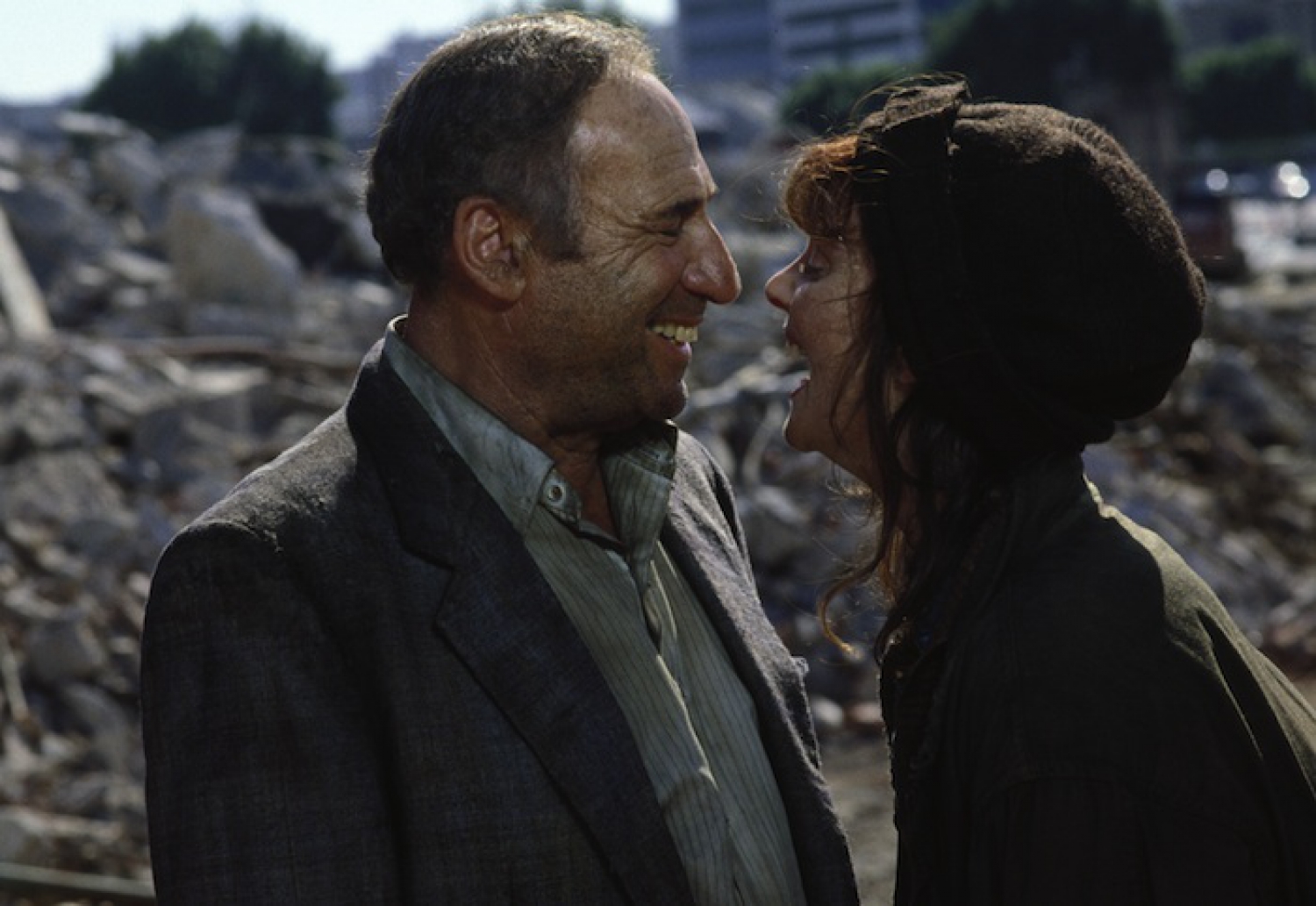
“Life Stinks” is ranked the lowest for the simplest of reasons: it’s just not that funny or not as funny as a Mel Brooks film should be. Brooks stars as selfish blowhard billionaire Godard Bolt (not unlike anybody who is currently the president of the United States) who is oblivious to the suffering of the little guy.
A rival businessman, Vance (a young Jeffrey Tambor), has his heart set on a recently purchased land of Godard’s. Vance seduces Godard into a wager: survive on the streets for 30 days without any of his financial privileges and then he can have half of his property and if he fails, Vance will have half of this property.
This being an ode to the 1939′ Preston Sturges classic ”Sullivan’s Travels”, the premise is simple and the moral even more so. Brooks’ leading turn and Lesley Ann Warren as the crazed bum who becomes his love interest, is what makes this film work and without their charm this film would have completely fallen apart.
Despite the film never reaching full-blown belly laughs, there’s a sweet nature about this film, and unlike many other Hollywood entries into the woes of the common man or the rich man learning his lesson, this film feels genuinely earnest. The streets and the people roaming them look real.
Despite its massive imperfects, this film did made life stink just a little less.
10. Dracula: Dead and Loving It
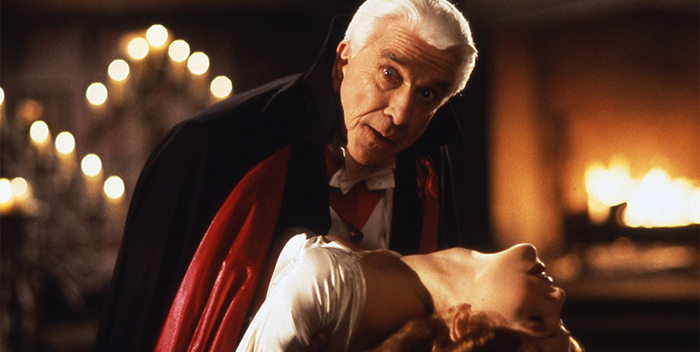
“Young Frankenstein” is an immortal comedy classic and having Brooks return to spoof the classic horror genre should be an exciting prospect. Sadly, even with comedy legend Leslie Nielsen playing the vampire icon, it never manages to even come close to the 1974 classic.
The story follows the classic Bram Stoker’s Dracula tale – fitting since this came out after Francis Ford Coppola’s successful adaptation – but instead of Harker (Steven Weber) arriving at Count Dracula’s castle, it’s Renfield (Peter MacNicol). Van Helsing is brilliantly played by Brooks (with an accent that is almost as ridiculous as the one Hopkins used). The brilliant Harvey Korman plays Dr. Seward, Amy Yasbeck plays Mina, and Anne Bancroft has an enjoyable cameo as an ominous Gypsy Woman.
To tell you the truth, much of it feels tired, almost as though Brooks is desperate for a joke. Yet, there are occasional moments of hilarity which reminds of Brooks’ brilliance. The best moments unsurprisingly come when Brooks himself appears on screen and comes face to face with Nielsen. It would have been great to see two icons together on screen once again, but alas, that will never happen.
“Dracula: Dead and Loving It” would be the last auteur film from Brooks to date. It would be an underwhelming ending to his hilarious oeuvre, but there is still hope for that “Spaceballs” sequel. Here’s hoping that Brooks will direct a film to the big screen once again.
9. The Twelve Chairs
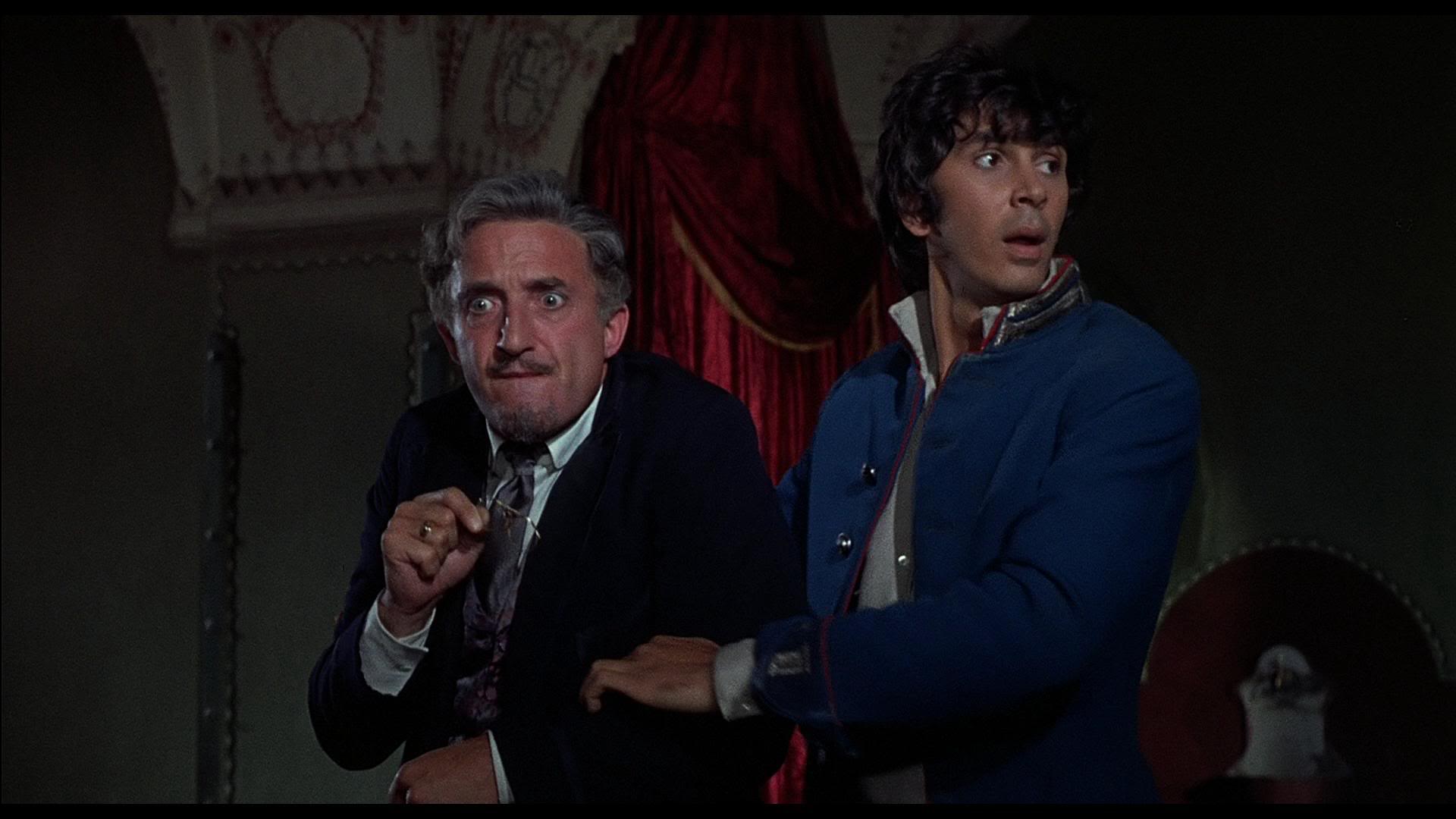
Mel Brooks’ second directorial feature, “The Twelve Chairs” has often been overlooked and it’s easy to see why: it’s not as edgy as “Blazing Saddles” or his first feature “The Producers”, nor is it as silly and manic as his other films. It’s much more subdued, seeing as this is an adaptation of a classic piece of Russian literature from Ilf and Petrov. And as one could expect for Russian literature, this is really about the human condition, whether man is inherently selfish or can be redeemed.
Shortly after the Bolshevik revolution, former aristocrat Vorobyaninov (Ron Moody) hears from his dying mother that she hid diamonds in one of their mansion chairs before they had to flee the Bolsheviks.
When Vorobyaninov returns to his hometown to seek the missing chairs, he is forced to team up with a young grifter named Ostap (a young and dashing Frank Langella). Meanwhile, they have a rivalry in the form of a corrupt Orthodox priest (Dom DeLuise) who is also looking for the chairs, after hearing Vorobyaninov’s mother’s penultimate confession.
The original novel ends on a much bleaker note, where man is proven to be inherently selfish. In this version, man is redeemable, or is perhaps able to foster a meaningful friendship in a world filled with the spiritually vacuous. “The Twelve Chairs” might be an oddity in Brooks’ career with its subdued nature but it’s well worth the watch.
What makes this film work is the chemistry between Moody and Langella, who are both perfectly cast in their respective roles. The friendship between Vorobyaninov and Ostap gives this film a heart and though it might be sanitized compared to the novel, you can’t help but be happy that it ends the way it does.
8. Silent Movie
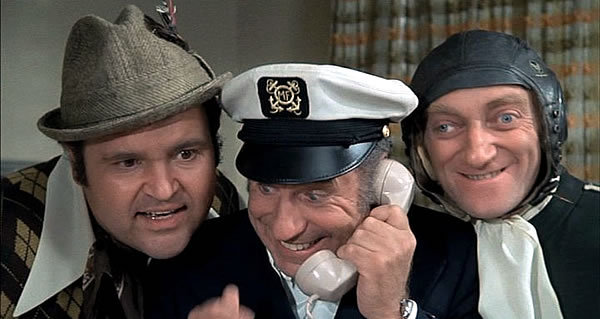
Out of all of Brooks’ films, many of them pushing the boundaries of taboos and good taste, “Silent Movie” might be his most riskiest film. Why? Well, as the title suggests, it’s a silent movie. People who might have loved “Spaceballs” or “Blazing Saddles” might not be so keen on the old-school style of “Silent Movie”. The slapstick might seem dated and many of the inside jokes will go over their head.
Many people might be put off by the silent movie format, as many had been with the 2011 Oscar-winning film “The Artist”. Those who can appreciate the form and understand what Brooks is doing will find something very special here.
The story concerns a washed-up director Mel Funn (Mel Brooks obviously) and his two goons (Dom DeLuise and Marty Feldman) and their journey of making a silent movie. The studio (led by Sid Caesar, a man who was a huge inspiration to Brooks) at first balks at this idea – which is probably what happened when Mel Brooks himself pitched this film – but facing bankruptcy, they throw their support on Mel and his goons. The caveat is that he must convince big movie stars to appear in the film.
The film is loaded with cameos from movie stars who were big in the 70s, though any cinematic connoisseur must be able to recognize them, as many of them have become legends. This film proves the diversity of Brooks’ comedic talents, using a different and risky format yet still being successful. This is Mel’s tribute to the comedy that marked his youth and would inspire his later work. It might not be for everyone but you can’t miss it if you claim to be a fan.
7. Robin Hood: Men in Tights
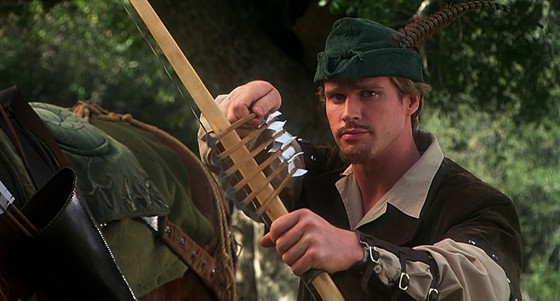
By this point in Brooks’ career, he would never again reach the comedic depths of his earlier classics, and the great thing about Brooks is that doesn’t seem to care that much. He just wants to work with a bunch of talented and funny people and have some fun. You get the feeling with Brooks that he doesn’t really have a plan. He’s just throwing stuff on screen, seeing what works and what doesn’t. It doesn’t matter – it’s just a silly movie. We take things too seriously. People who take life too seriously cannot enjoy Mel Brooks’ films.
“Robin Hood: Men in Tights” is a enjoyable parody of the Robin Hood films (and an unsubtle cash grab on the success of the most recent Robin Hood film of its day, “Robin Hood: Prince of Thieves”). Some things work, some things doesn’t. At times, there’s classic Mel Brooks and other times there’s a few awkward silences.
Cary Elwes is perfectly cast as Robin Hood (who brilliantly states that unlike other Robin Hoods, he can actually speak with an English accent) who assembles his merry men (including Dave Chappelle making his debut performance) to rebel against Prince John (Richard Lewis) and the Sheriff of Nottingham (the late great Roger Rees) and woo Maid Marian (Amy Yasbeck).
There are brilliant moments speckled through this mostly uneven film. There’s the appearance of Mel Brooks as Rabbi Tuckman, a peddler of circumcision (who rightfully complains that he should market himself to a younger crowd).
Dom DeLuise does an excellent Marlon Brando from “The Godfather” impression, who speaks like that because he just came from the dentist and still had cotton balls in his mouth, and there’s a great cameo from Patrick Stewart, who references and mocks Sean Connery’s cameo at the end of “Prince of Thieves”. There’s a hilarious running gag of Sheriff of Nottingham speaking in disordered sentences. All the trademarks are there: fourth wall breaking, playful stereotypes, silly music numbers, and an over-the-top German accent.
Best of all is that this film is littered with inside gags from Robin Hood films. Most won’t probably get it but those who do, this will be an enduring tribute (and will certainly be more fondly remembered than Ridley Scott’s dreary take on the Robin Hood mythos).